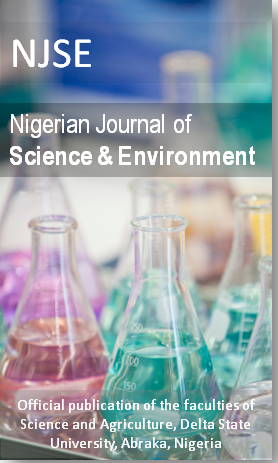
NIGERIAN JOURNAL OF SCIENCE AND ENVIRONMENT
Journal of the Faculties of Science and Agriculture, Delta State University, Abraka, Nigeria
ISSN: 1119-9008
DOI: 10.5987/UJ-NJSE
Email: njse@universityjournals.org
CONSERVATION OF ENERGY IN A GROWING ECONOMY
DOI: 10.5987/UJ-NJSE.16.038.1 | Article Number: 31AEC34 | Vol.11 (1) - September 2012
Author: Uchegbulam O
Keywords: energy, conservation, efficient, economy
The demand for energy is rising rapidly with growing population and industrialization. Conservation of energy has become increasingly important as energy usage rates and shortages have increased. This is compounded by limited availability of non-renewable energy sources like fossil fuels ( coal, petroleum, natural gas ), firewood and other secondary non-renewable energy sources. There is the need to sensitize the public on ways to conserve-maximize the use and avoid or minimize wastage of energy. Nigeria presently generates a little above 3000MW of electrical power. The power generated is far less than what our present population of about 150 million people need for domestic, industrial and transportation usage. This study highlights the role of efficient transport system in conservation of petroleum products. Also many house appliances were examined and ways of conserving electrical energy in them recommended. This paper also highlights prudence on the part of energy users as a way of saving cost and avoiding wastages. Although what we generate is far less than what we need, if these measures are implemented, more energy will be saved. Less burning of fossil fuels also means lower emissions of carbon-dioxide CO2, one of the primary contributors to global warming, and other pollutants. Increased power generation as well as alternative means of energy generation using renewable sources like solar, wind and biomass is encouraged, so that our natural resources will be available for future generations.
Beiser, A. (2004). Applied Physics. Schaum’s
Outline (4th Edition) McGraw-Hill Inc.,
New York.
Montgomery, C. W. (2003). Environmental
Geology (6th Edition). McGraw-Hill Inc.,
New York.
Young, H. D. and Freeman, R. A. (2006).
University Physics (Vol. 1, 12th Edition)
Pearson Addison-Wesley, San Francisco.
Rao, S. and Parulekar, B. B. (2007). Energy
Technology; Nonconventional, Renewable
and Conventional. Khanna Publishers,
New Delhi.
Serway, R. A. and Faughn, J. S. (2003). College
Physics (6th Edition). Thomson
Books/Cole, Belmont.
Tiwari, S. N. (2007). Global Warming and
it’s Effects on Environment, Adhyayan
Publishers & Distributors, New Delhi.
Ackerman, S. A. and Knox, J. A. (2003).
Meteorology; Understanding the atmosphere.
Thomson Brooks/Cole, Belmont.
United States Environmental Protection
Agency (1997). EPA-905-F-97-011, August
1997.
